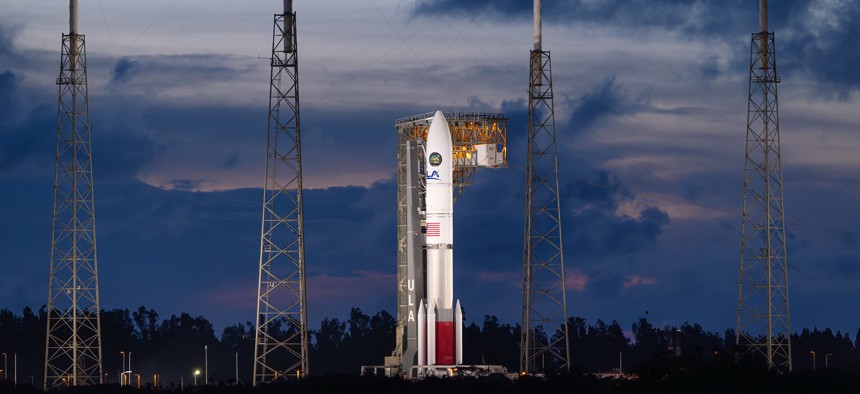
The Pentagon launched its first experimental navigation satellite in nearly 50 years, aiming to test out new technology that could shape future military GPS programs.
United Launch Alliance’s new Vulcan rocket launched the Navigation Technology Satellite-3 from Cape Canaveral, Florida, on Tuesday. The satellite will test new anti-spoofing signals, a steerable phased-array antenna to send signals to ground forces in high-jamming areas, and receivers to help the satellite operate without instructions from ground controllers, Joanna Hicks, a senior research aerospace engineer at the Air Force Research Laboratory, told reporters Monday ahead of the launch.
The Pentagon and AFRL spent about $250 million to develop the NTS-3 satellite and the ground system, and L3Harris was the prime contractor for the program.
The satellite was built to be reprogrammed from the ground, “so we don’t have to have everything planned out before we go on orbit and before we see what the threats are,” Hicks said.
The program aims to build resiliency in the military’s GPS constellation, but also to pave the way for new position, navigating, and timing capabilities. Most of the service’s PNT satellites are in medium-Earth orbit, but NTS-3 will be sent to geostationary-Earth orbit to experiment with different positioning for the mission.
“One of the things that NTS-3 is testing…is the multi-orbit constellation concept. So can we receive signals from NTS-3 at GEO as well as GPS at MEO, and take advantage of all of them? Maybe in the future, we’ll be able to put some of these technologies in [low-Earth orbit], for example. We don’t currently have that as a planned mission, but that’s something that could conceivably happen in the future,” Hicks said.
The last experimental navigation satellite was launched almost 50 years ago, Hicks said: “At the lab, we think that we are overdue for an experiment in this area.”
The mission was supposed to launch in 2022, but delays with ULA’s Vulcan pushed it to this year. During that downtime, Hicks said the program added capabilities and experimental signals: “We’ve really been able to take advantage of that and make sure that we are ready for the best possible experimental mission on orbit.”
The team expects to start collecting data within a few weeks, and the entire mission will last about a year. AFRL doesn’t plan on using the satellite in actual operations after the year is up, but they are working with “some organizations to talk about how they might use leftover capabilities for testing,” Hicks said.
Tuesday’s launch also marks a milestone for ULA: it’s the first national-security mission to fly on the company’s new heavy-lift Vulcan rocket. The rocket has been late to launch due to development problems and certification delays after material broke off one of the solid rocket boosters during its second flight in October.
Vulcan was supposed to launch four Space Force missions last year, but that was reduced to two and pushed to this year. The company aims to launch twice a month, with a combination of Vulcan and Atlas rockets, by the end of the year—facing pressure to clear a backlog of missions that have stacked up due to Vulcan delays. Tuesday’s launch is the first of 25 launches the Space Force has ordered from ULA in phase two of the National Security Space Launch program.
“We obviously have a backlog of missions that we’re working through…I will say that we’re ready and postured to launch as quickly as we can as we work through that backlog,” said Col. Jim Horne, Space Systems Command mission director.
The post Space Force launches experimental satellite to inform future GPS appeared first on Defense One.




